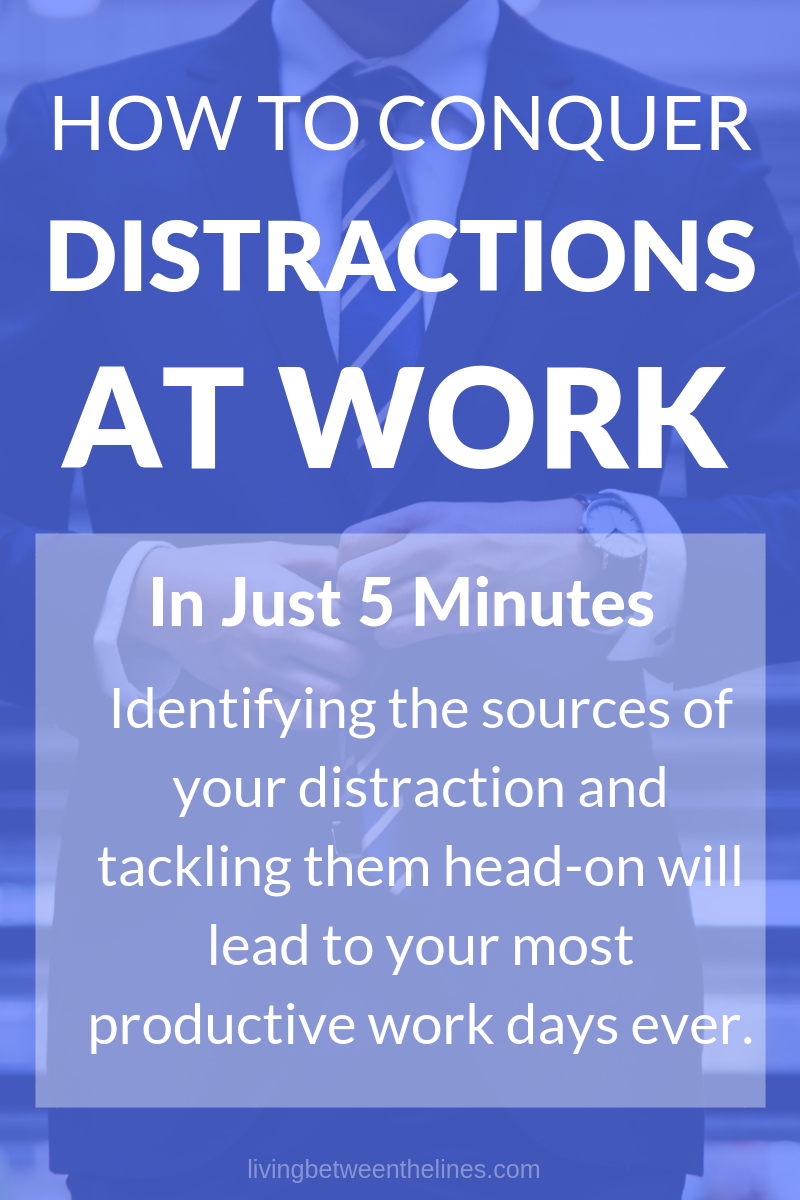The key to productivity in the office is identifying distractions and eliminating them to the best of your ability. This seems obvious, but realistically, how often do you give much thought to the source of your distraction?
If you can pinpoint the reasons you’re unable to focus, you have a much better chance of overcoming them.

For your convenience, I’ve split distractions into sections based on their source. Each section has a few actionable tips on what you can do in-the-moment to eliminate distractions. A few even have long-term solutions to stop recurring problems.
Environment
If the problem is in your environment, your ability to respond mostly depends on how much freedom your office environment offers you.
Like many people, I find it difficult to focus in noisy environments. If you have your own office, close your door. If you’re worried about seeming unavailable, my solution is usually to tape a sign that says “Not antisocial, just cold – come on in!” on my door. Depending on your office culture, you may need to choose a slightly more professional message, but it should do the trick. In an open office, you may not be able to control how much noise others make, but you could put on headphones to block out the sound.
Other people prefer a solid wall of background noise, and find silence stifling. If you can, head to a coffeeshop or other busy area with plenty of seating and ambient noise. If not, try playing music or, even better, white noise. Coffitivity is a pretty good substitute for a bustling café.
- If you’re able to move freely, find somewhere that suits your needs
- If not, use music or white noise to either block out or fill in the noise as needed
Technology
If technology is distracting you, you’re not alone. The temptation to check social media or news is always strong, and can be hard to resist at a desk job!
A ‘lite’ solution would be to set limits. For instance, perhaps you’re allowed to scroll through Facebook, but you have to set a five minute timer before you start, and you have to stop once your allotted time is up. Or maybe you wait to read theSkimm until lunch. If you have self-control, cultivating mindfulness about your tech use is the next step to your best productivity.

That said, for some of us, it’s all-too-easy to ignore an alarm or timer and just. Keep. Scrolling. For those cases, it’s best to use technology to your advantage! On phones, an app like Offtime (available for iOS and Android) will help stifle your access to distracting apps, and filter your notifications. If the computer is the issue, I like LeechBlock, which works for both Chrome and Firefox. It will allow you to completely block sites, or limit your time on them to say, five minutes an hour.
- Start by cultivating mindfulness about your tech use and relying on your self-control
- If that doesn’t work, break out the big guns and start blocking distracting apps and sites.
People
If the problem is social, you’ve opened a whole new can of worms. Maybe your annoying co-worker won’t stop talking for love or money. Or maybe you’ve gotten friendly with someone, and now it’s way easier to talk to them than be productive. Navigating this particular distraction can be tricky.
If you don’t know the person well, there’s always an element of risk involved. If you’re in an office setting, I’d really recommend speaking to a manager or supervisor. You shouldn’t necessarily get them involved, but they may have valuable insight on how to broach the subject with your co-worker. If that’s not an option, just aim for polite-but-firm conversation exits. And, as tempting as it is, don’t offer to talk more about the topic later if you never intend to follow through on it – you may be well-intentioned, but flaking out like that is rude.
However, I’m of the opinion that you should always be straightforward with your friends. Unless your study/office buddy is telling you something really important, there’s never a ‘bad’ time to say “Hey, I love talking to you, but I just remembered I need to get XYZ done.” In this case, you probably will talk to them later, so offer to follow up! As a long-term solution, work on setting boundaries. A few minutes chatting about your weekends at work isn’t a problem, but a play-by-play of everything you’ve done when you’re supposed to be studying? Maybe that’s best saved for a lunch break, or a coffee after you’re done.
- Be polite but firm in backing out of long conversations, and don’t offer to talk about it later unless you mean it.
- Work on setting boundaries with chronic talkers, and confining chit-chat to lunch or after-hours.
Overwhelm
If your project is huge and intimidating, you’ll need to make it more approachable. Brain dump everything you know about this project. If you’re unfamiliar, read this comprehensive guide to brain dumps. If you need a crash course: write literally everything you need to do for the project down on paper or a Word document, without worrying about how big or small the task is, or what order you’re writing in. Make sure each project task is broken into its smallest individual pieces. Then, group the tasks together, identify the most pressing ones, and prioritize.
The next step, of course, is to get started. Hopefully, making a comprehensive list will give you momentum and propel you forward. But it always helps to think about what motivates you, and use that to your advantage.

If you’re more motivated by positive reinforcement, knock some easy tasks out right away for a sense of accomplishment. Set a concrete, but achievable goal, and promise yourself a reward if and only if you reach it. (Tell a friend or co-worker, if you need some accountability help.) Spend five minutes thinking about the positive impacts finishing this project will have, and write a reminder of the rewards on a sticky note to hang somewhere prominent.
If you’re more motivated by negative reinforcement or fear, you should work on changing your mindset. That said, you probably won’t accomplish that goal overnight, so work with what you have. Impose unpleasant restrictions until you finish certain portions of the project, like blocking social media. Take a few moments to think about the consequences of falling behind, and use them to motivate yourself forward.
- Break large projects into more manageable parts in a visible, physical way
- Remember what motivates you and play to it
Take Stock of Your Resources
Last but not least, be aware of the resources at your disposal. If you’re seriously struggling with focus, you don’t need to be completely self-reliant. Speak to your manager or supervisor about what options are available to you. If your current options are limited, in most cases, you’re within your rights to suggest some changes. The key is tone.
If you come across as whining, or making excuses for poor performance, you may not be taken seriously.
Focus on bringing reasonable solutions to the table. Don’t just come into a meeting with complaints, but observations and solutions. Clarify your meaning any time you feel you might be misinterpreted. And don’t take counterarguments personally; if you want to make changes, you should be able to justify them.
You may not get what you ask for, and you’ll rarely get everything you wanted. But a good manager will be open to your ideas, at the very least.


